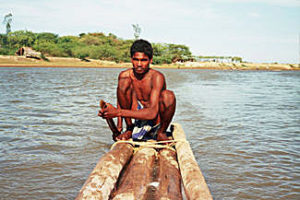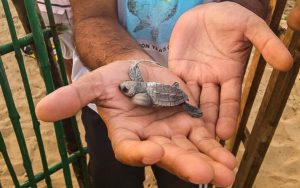The Yanadi of coastal Andhra Pradesh are monitoring the nests of the ocean-dwelling olive ridley turtles that come ashore to lay their eggs. The people are hoping their efforts will help protect the species from declining.

A news story in The Hindu at the beginning of last week indicated that wildlife authorities are directing the volunteers—Yanadi and other fisherfolks—to protect the newly laid eggs in two different ways along the coast. The reason for the different approaches is the relative security of the eggs before they finally hatch into baby turtles.
When the adult turtles swim ashore at the beginning of winter and lay their eggs in the Godavari River estuary, the eggs are left in their natural habitats—the coastal beaches where they have been laid. According to C. Selvan, Divisional Forest Officer, 70,000 hatchlings returned to the sea at the appropriate time earlier this year.
At least 15 breeding places have been identified where the turtles are laying their eggs this season. The Yanadi “will constantly monitor the situation in vulnerable areas observing the arrival of turtles besides protecting the nesting sites,” Selvan said.

However, eggs laid in the Krishna River beaches are removed and protected in special hatcheries. That is a way to prevent them from being eaten by jackals and wild boars. Last winter, people gathered and protected 30,000 eggs and over 29,000 of them hatched and were released into the sea at the end of the winter. Officials are predicting that the egg laying will be delayed this year on the beaches due to recent flooding in the Krishna River.
News stories in 2017 and 2018 about the Yanadi involvement in protecting the turtle eggs indicated that the young turtles are heavily consumed by predators in the ocean. Only about one out of one thousand hatchlings released into the sea will survive into adulthood and attempt to return to the same beach so they can lay their own eggs.